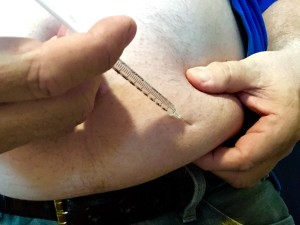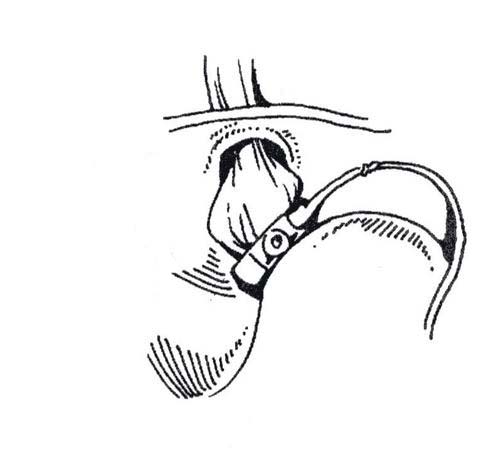The most effective treatment of Type 2 Diabetes is surgery for weight loss. Currently 26 million Americans have been diagnosed with type 2 diabetes, and many are overweight. While the mainstay treatment has always been to decrease weight, there has never been a diet or consensus about how to do it. The “diabetic diet” that many are placed upon is rather ineffective by itself.

The Most Effective Treatment for Diabetes is Weight Loss Surgery
The American Diabetes Association, the International Diabetes Federation, and 43 other health groups developed a consensus that surgery should be considered the option for those who qualify. Their consensus reads that for those whose body mass index is over 40 should undergo surgery regardless of their overall blood sugar, and for patients with a BMI of 35 whose diabetes is inadequately controlled in spite of lifestyle changes and medication. The guidelines even went so far as a BMI of 30 (which the FDA recently approved for the Lap-Band).
The 11 studies they examined all compared various weight loss operations to standard treatment for diabetes. In all the studies, weight loss surgery had better control, and often – as in the case of the Lap-Band study, showed remission of diabetes.
Weight Loss Surgery’s effect on Diabetes has been known for years by weight loss surgeons. So much so they are now called “Metabolic” operations. The number of insurance companies that have expanded coverage has increased, and yet the number of weight loss operations has not increased since 2009.

The first study showing surgery was more effective than standard diabetic care involved the Lap-Band in 2008. The study compared standard treatment of diabetes with intensive lifestyle changes to Lap-Band with lifestyle changes. The Lap-Band showed a remission in Type 2 Diabetes in 75% of people who had been diagnosed with Diabetes for less than two years. The Lap-Band remains the least invasive and least costly of all weight loss operations.
Cost of weight loss surgery has decreased to as little as $10,000 for a Lap-Band done in the United States. If you believe you qualify for weight loss surgery, you should contact our office for a consultation. (602-234- SLIM). It is our belief that lifestyle changes with weight loss surgery make a powerful combination. Weight loss surgery (metabolic surgery) without the lifestyle changes is like buying a Ferrari without using high octane gasoline.

Lifestyle changes are critical to weight loss. But without weight loss surgery it is like trying to mow 1000 acres with this lawn mower. Surgery is like having a riding lawn mower. Still a lot of work- but it makes it easier.
REFERENCES:
Metabolic Surgery for Type 2 Diabetes: Changing the Landscape of Diabetes Care
William T. Cefalu1⇑, Francesco Rubino2 and David E. Cummings3
Corresponding author: William T. Cefalu, cefaluwt@pbrc.edu. Diabetes Care 2016 Jun; 39(6): 857-860. http://dx.doi.org/10.2337/dc16-068
Rubino F, Nathan DM, Eckel RH, et al.; 2nd Diabetes Surgery Summit. Metabolic surgery in the treatment algorithm for type 2 diabetes: a joint statement by international diabetes organizations. Diabetes Care 2016;39:861–877
Dixon JB, O’Brien PE, Playfair J, et al. Adjustable gastric banding and conventional therapy for type 2 diabetes: a randomized controlled trial. JAMA 2008;299:316–323pmid:18212316
Mingrone G, Panunzi S, De Gaetano A, et al. Bariatric surgery versus conventional medical therapy for type 2 diabetes. N Engl J Med 2012;366:1577–1585pmid:22449317
Schauer PR, Kashyap SR, Wolski K, et al. Bariatric surgery versus intensive medical therapy in obese patients with diabetes. N Engl J Med 2012;366:1567–1576pmid:22449319
Courcoulas AP, Goodpaster BH, Eagleton JK, et al. Surgical vs medical treatments for type 2 diabetes mellitus: a randomized clinical trial. JAMA Surg 2014;149:707–715pmid:24899268
Wentworth JM, Playfair J, Laurie C, et al. Multidisciplinary diabetes care with and without bariatric surgery in overweight people: a randomised controlled trial. Lancet Diabetes Endocrinol 2014;2:545–552pmid:24731535
Parikh M, Chung M, Sheth S, et al. Randomized pilot trial of bariatric surgery versus intensive medical weight management on diabetes remission in type 2 diabetic patients who do NOT meet NIH criteria for surgery and the role of soluble RAGE as a novel biomarker of success. Ann Surg 2014;260:617–622; discussion 622–624pmid:25203878
Schauer PR, Bhatt DL, Kirwan JP, et al.; STAMPEDE Investigators. Bariatric surgery versus intensive medical therapy for diabetes–3-year outcomes. N Engl J Med 2014;370:2002–2013pmid:24679060
Mingrone G, Panunzi S, De Gaetano A, et al. Bariatric-metabolic surgery versus conventional medical treatment in obese patients with type 2 diabetes: 5 year follow-up of an open-label, single-centre, randomised controlled trial. Lancet 2015;386:964–973pmid:26369473
Gloy VL, Briel M, Bhatt DL, et al. Bariatric surgery versus non-surgical treatment for obesity: a systematic review and meta-analysis of randomised controlled trials. BMJ 2013;347:f5934pmid:24149519
Sjöström L, Peltonen M, Jacobson P, et al. Association of bariatric surgery with long-term remission of type 2 diabetes and with microvascular and macrovascular complications. JAMA 2014;311:2297–2304pmid:24915261
